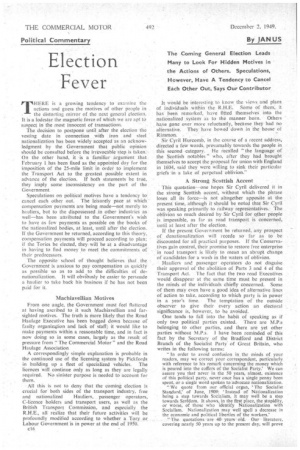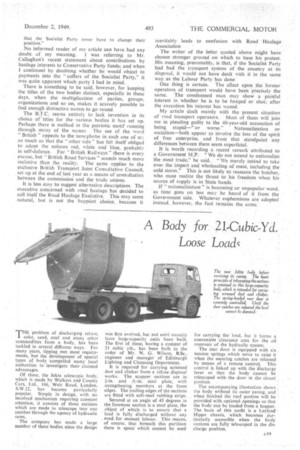Political Commentary By JAN US
Page 62

Page 65

If you've noticed an error in this article please click here to report it so we can fix it.
Election Fever
The Coming General Election Leads Many to Look For Hidden Motives in the Actions of Others. Speculations, However, Have A Tendency to Cancel Each Other Out Says Our Contributor THERE is a growing tendency to examine the actions and guess the motives of other people in — the distorting mirror of the next general election. It is a lodestar the magnetic force of which we are apt to suspect in the most innocent of transactions.
The decision to postpone until after the election the vesting date in connection .. with iron and steel nationalization has been widely accepted as an aeknowledgment by the Government that public opinion should be consulted before the irrevocable step is taken..
On the other hand, it -is a familiar argument that February 1 has been fixed as the appointed day for the imposition of the 25-mile limit in order to implement the Transport Act to the greatest Possible extent in advance of the election. If both statements be true, they imply some inconsistency on the part of the Government .
Speculations on political motives have a tendency to cancel each other out. The leisurely pace at which compensation payments are being made—not merely to hauliers, but to the dispossessed in other industries as well—has been attributed to the Government's wish to have as few payments as possible on the books of the nationalized bodies, at least, until after the electionlithe Government be returned, according to this theory,
compensation payments will proceed according to plan; if the Tories be elected, theywill be at a disadvantage in having to find money to meet the coffin-fitments of
their predecessors. .
The opposite school of thought believes that the Government is anxious to pay compensation as quickly as possible so as to add to the difficulties of denationalization. It will obvibusly be easier to persuade a haulier to take back his business if he has not been paid for it.
Machiavellian Motives From one angle, the Government must feel flattered at having ascribed to it such Machiavellian and farsighted motives. The truth is More likely that the Road Haulage Executive has been bogged down because of faulty organizaIion and lack of staff; it would like to make payments within a reasonable time, and in fact is now doing so in some cases, largely as the result of pressore from !' The Commercial Motor" and the Road Haulage Association A correspondingly simple explanation is probable in the continued use of the licensing system by Pickfords in building up a fleet of specialized Vehicles. The licences will continue only as long as they are legally required. No sinister purpose is needed to account for them.
All this is not to deny that the coming election is crucial for both sides of the transport industry, free and nationalized Hauliers, . passenger operators, C-licence holders and transport users, as well as the British Transport Commission, and especially the R.H.E., all realize that their future activities will be profoundly modified according to whether a Tory or, Labour Government is in power at the end of 1950.
c16
. It Would. be interesting to know the views and plans Of individuals within the R.H.E. Some of them, it has been remarked, have fitted themselves into the nationalized _system: as to the manner born. Others have gone over more reluctantly, because they had no alternative. They have bowed down in the house of Rimmon. ' • Sir Cyril Hurcomb, in the course of a recent address, directed a few words, presumably towards the people in this second category. He recalled the language of the Scottish notables" who, after they had brought themselves to accept the proposal for union with England in 1604, said they were willing to sink their particular griefs-in a lake of perpetual oblivion."
A Strong Scottish Accent
This quotation--one hopes Sir Cyril delivered it in the strong Scottish accent, without which the phrase loses all its force–is not altogether apposite at the present time, although it should be noted that Sir Cyril was speaking primarily to railway representatives. The oblivion so much desired by -Sir Cyril for other people is impossible, as far as road tranSport is concerned, until at least after the election.
If the present Government be returned, any prospect of denationalization will recede so far as to be discounted for all practical purposes. If the Conservatives gain control, their promise to restore free enterprise in road transport is likely to mean an abrupt change of candidates for a wash in the waters of oblivion.
Hauliers and passenger operators do not disguise their approval of the abolition of Parts 3 and 4 of the Transport Act. The fact that the two road Executives would disappear at the same time must be present in the minds of the individuals chiefly concerned. Some of them may even have a good idea of alternative lines of action to take, according to which party. is in power in a year's time. The temptation of the outside observer to give their every action an electoral significance is, however, to be avoided.
One tends to fall into the habit of speaking as if
only two political parties existed. There are M,P.s belonging to other parties, and there are yet other parties without .M.P.s. 1 have been reminded of this fact, by the Secretary of the Bradford and District Branch of the Socialist Partyof Great Britain, who writes in the following terms: " In order to avoid confusion in the minds of your readers, may we correct your correspondent, particularly with reference to his remark concerning the money which is poured into the coffers of the Socialist Party.' We can assure you that never in the 50 years, almost, existence of this political party, never once has a single penny been spent, or a single word spoken to advocate nationalization.
We quote from our official organ. 'The Socialist Standard,' of June. 1909: Instead of Nationalization being a step towards Socialism, it may well be a step towards Serfdom, it shows, in the first place, the stupidity, or worse, of those who identify Naticinalization with Socialism. Nationalization may well spell a decrease in the economic and political liberties of the workers.'
"The quotations -are 40 years' old. Our literature, covering nearly 50 years up to the present day, will prove
that the Socialist Party never have to change their position:' . No informed reader of my article can have had any doubt of my meaning. I was referring to Mr. Callaghan's recent statement about contributions by haulage interests to Conservative Party funds; and when I continued by doubting whether he would 'object to payments into the "coffers of the Socialist Party," it was quite apparent which party I had in mind.
There is something to be said, however, for keeping the titles of the two bodies distinct, especially in these days, when the multiplication of parties, groups, organizations and so on, makes it scarcely possible to find enough distinctive names to go-rot:Ind.
The B.T.C. seems entirely to lack invention in its choice of titles for the various bodies it has set up. Perhaps there is method in the patriotic motif running through many of the names. The use of the word " British " appeals to the xenophobe in each one of LE; so much so that the "other side " has felt itself obliged to adopt the colours red, white and blue, probably in self-defence. For "British Railways" there is every excuse, but "British Road Services" sounds much more inclusive than the reality. The same appliesto the exclusive British Transport Joint Consultative Council, set up at the end of last year as a means of.consultation between the commission and the trade unions.
It is less easy to suggest alternative descriptions The executive concerned with road haulage has decided to call itself the Road Haulage ExeCutive. This may seem natural, but is not the happiest choice, because it
inevitably leads to confusion with Road -Haulage Association
The writer of the letter quoted above might have chosen stronger ground on which to base his protest. His meaning, presumably, is that, if the Socialist Party had had the transport system of the country at its disposal, it would not have dealt with it in the same way as the Labour Party has done One thing is certain. The effect upon the former operators of transport would have been precisely the same. The condemned man may show a painful interest in whether he is to be hanged or shot; after the execution his interest has waned.
My article dealt mainly with the present situation of road transport operators. Most of them will join me in pleading guilty to the 40-year-old accusation of being stupid—" or worse." Nationalization or socialism—both appear to involve the loss of the spirit of free enterprise, and from that standpoint any differences between them seem superficial.
It is worth recording a recent remark attributed to a Government M.P."We do not intend to nationalize
the meat trade," he said We merely iptend to take over the import and wholesaling of meat, including the cold stores." This is not likely to reassure the butcher, who must realize the threat to his freedom when his source of supply is in State hands.
If " nationalization " is becoming an unpopular word, as time goes on less may be heard of it from the Government side, Whatever euphemisms are adopted instead, however, the fact remains the same.












































































































